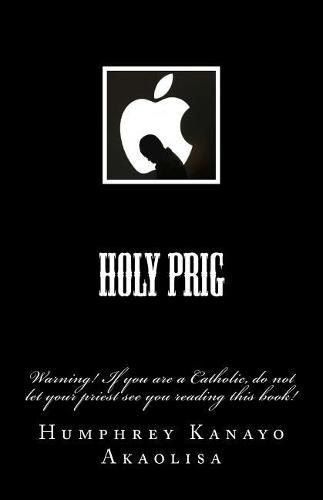Readings Newsletter
Become a Readings Member to make your shopping experience even easier.
Sign in or sign up for free!
You’re not far away from qualifying for FREE standard shipping within Australia
You’ve qualified for FREE standard shipping within Australia
The cart is loading…






Holy Prig In this fine artistic masterpiece, the author has dealt a scintillating handling on the subtle subject of priestly vocation, which has flourished in South-eastern Nigeria over the past five decades. It’s an interesting narrative on the lives and making of priests in sub-Saharan Africa. In the Story, Father Patrick, the protagonist, a young priggish priest, lives a natural and true life of a prig. He keeps in mind the days of formation in the seminary. He is however distracted and disdained by the socio-cultural environment; the traditions of his people, passions, love, imperfections, and shallow understanding of the minds around him. He prigs the consciences with his consummate life. The book is a hilarious strong voice, humorous, cynical, thought provoking and presented in a buoyant didactic tone. The story makes the reader induced to hope that so perfect a character exists in reality. Unfortunately, it is purely imaginary, and definitely not intended for anybody. Indeed, you will not remain the same after reading this book. As a writer of conscience, Akaolisa Obikwelu has proven a greater asset to the Catholic Mission from the outside than as an insider-priest, ironically. We have not heard the last yet from this young but highly mature thinker and author. Jim Pressman, Literary Reporter/Editor Akaolisa has finally demystified the socio-cultural hidden perceptions and pressures on young boys of Igbo extraction who are about to, in or out of Catholic seminary. Once an insider himself, he knows where the corpses are buried, Lucid and fearless. Rev. Fr. Romanus C. Okongwu, Awka Diocese ‘Both the first and second person narratives have been used to achieve this simple, yet complex telling fiction to generate the intended purpose.’ Eberekpe Ogho, Author, Abuja ‘This book should be a 'vademecum’ for all, especially seminarians.‘ Rev. Fr. Abel NzubechukwuEzenwa, Orlu Diocese If this little work should have the effect of making even one prig more priggish, the writer will not have labored in vain
$9.00 standard shipping within Australia
FREE standard shipping within Australia for orders over $100.00
Express & International shipping calculated at checkout
Holy Prig In this fine artistic masterpiece, the author has dealt a scintillating handling on the subtle subject of priestly vocation, which has flourished in South-eastern Nigeria over the past five decades. It’s an interesting narrative on the lives and making of priests in sub-Saharan Africa. In the Story, Father Patrick, the protagonist, a young priggish priest, lives a natural and true life of a prig. He keeps in mind the days of formation in the seminary. He is however distracted and disdained by the socio-cultural environment; the traditions of his people, passions, love, imperfections, and shallow understanding of the minds around him. He prigs the consciences with his consummate life. The book is a hilarious strong voice, humorous, cynical, thought provoking and presented in a buoyant didactic tone. The story makes the reader induced to hope that so perfect a character exists in reality. Unfortunately, it is purely imaginary, and definitely not intended for anybody. Indeed, you will not remain the same after reading this book. As a writer of conscience, Akaolisa Obikwelu has proven a greater asset to the Catholic Mission from the outside than as an insider-priest, ironically. We have not heard the last yet from this young but highly mature thinker and author. Jim Pressman, Literary Reporter/Editor Akaolisa has finally demystified the socio-cultural hidden perceptions and pressures on young boys of Igbo extraction who are about to, in or out of Catholic seminary. Once an insider himself, he knows where the corpses are buried, Lucid and fearless. Rev. Fr. Romanus C. Okongwu, Awka Diocese ‘Both the first and second person narratives have been used to achieve this simple, yet complex telling fiction to generate the intended purpose.’ Eberekpe Ogho, Author, Abuja ‘This book should be a 'vademecum’ for all, especially seminarians.‘ Rev. Fr. Abel NzubechukwuEzenwa, Orlu Diocese If this little work should have the effect of making even one prig more priggish, the writer will not have labored in vain